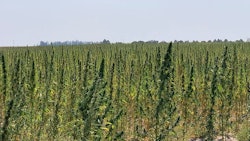
Editor's Note: This story was updated Sept. 28 to more accurately describe HIA's lawsuits against the DEA.
When the Agriculture Improvement Act of 2018 (the 2018 Farm Bill) legalized hemp production in the U.S., removing the crop and its derivatives from Schedule I of the Controlled Substances Act (CSA), it was a victorious moment for the industry.
But among the triumph, some industry veterans, like Joy Beckerman, principal of Hemp Ace International, couldn’t shake a nagging thought: Would the U.S. Drug Enforcement Administration (DEA) once again try to interfere in hemp?
“The DEA is addicted to the prohibition of the cannabis plant in all of its forms,” Beckerman tells Hemp Grower.
With evidence mounting in support of that thought over the past year, the DEA’s recently proposed interim final rule (IFR) on hemp and its derivatives has, for many industry members, confirmed the DEA’s intent to try and retain its authority over hemp.
The DEA states in its IFR that any material containing more than 0.3% delta-9 tetrahydrocannabinol (THC) on a dry-weight basis is still classified as a Schedule I substance, leading some to interpret that may include in-process hemp extract, as delta-9 THC levels tend to temporarily spike during extraction. The IFR also says “synthetically derived tetrahydrocannabinols,” which could include delta-8 THC, are Schedule I controlled substances as well.
Industry members have flooded the proposed rule’s public docket with nearly 2,500 comments to date, many of which object to the DEA’s involvement in the hemp world. (Comments on the docket close Oct. 20.)
But some industry members have taken their disapproval a step further: the Hemp Industries Association (HIA), along with RE Botanicals of Conway, South Carolina, have sued the DEA and its acting administrator Timothy Shea for the IFR.
Despite hemp’s recent legalization, the lawsuit is the latest in a decades-long history of the industry disputing the DEA’s involvement in hemp.
“We know the DEA again, in its outrageous addiction to prohibition, had an undue influence in this process [of regulating hemp],” Beckerman says. “We can hope the public comment process works, but we’ve learned all too well that litigation is the only language they speak.”
Lawsuit Details
HIA and RE Botanicals filed their petition Sept. 18 in the U.S. Court of Appeals for the District of Columbia Circuit.
In their petition, the plaintiffs assert not only that the DEA overstepped its legal authority and violated the 2018 Farm Bill, but also that it did not issue the IFR through the correct procedures required by law.
"When Congress passed the 2018 Farm Bill, it explicitly carved hemp and its derivatives out of the Controlled Substances Act so that hemp can be regulated as an agricultural commodity," said HIA President Rick Trojan in a news release following announcement of the lawsuit. "The DEA’s interim final rule could create substantial barriers to the legal manufacturing of hemp-derived products, a critical component of the hemp supply chain, and devastate the entire hemp industry. Although the DEA states that is not its intention, the rule must be amended to ensure hemp remains an agricultural crop as Congress intended."
The petitioners are represented by hemp industry attorneys at Vicente Sederberg LLP, Kight Law Office PC and Hoban Law Group, along with appellate attorneys from Yetter Coleman LLP.
Shawn Hauser, a partner at Vicente Sederberg, added that the DEA didn’t follow proper rule-making procedures with the IFR, such as providing notice and opportunity to comment, as the DEA said the rules went into effect immediately.
"The petitioners believe legal action is necessary to protect the lawful U.S. hemp industry that Congress intended to establish when it enacted the 2018 Farm Bill,” Hauser said in the news release.
Ongoing Involvement in Hemp
The HIA’s latest lawsuit against the DEA is the fifth it’s initiated against the agency since 2001, all of which have had at least some level of success.
Those lawsuits, all of which were filed in the Ninth Circuit Court of Appeals, include:
HIA et al. v. DEA et al. I, filed in 2001, when the DEA, without any compelling reason and without complying with the required public notice and comment period, issued an interpretive rule banning sterilized hempseed and hempseed oil food products containing "any amount" of delta-9 THC and treating them as Schedule 1 controlled substances. The HIA and other plaintiffs filed an "Urgent Motion for Stay" on the DEA’s interpretive rule, which the court granted in 2002.
HIA et al. v. DEA et al. II, filed in 2003, when, despite opposition, the DEA issued a final rule confirming its 2001 interpretive rule to re-classify sterilized hempseed and hempseed oil containing any amount of delta-9 THC as Schedule 1. At that time, the DEA also issued a final interim rule exempting hemp body care and fiber products from its control, but with its ongoing attempt to prohibit sterilized hempseed and hempseed oil, it effectively destroyed body care manufacturers' ability to make those products. The HIA and its co-plaintiffs emerged victorious in 2004, when Ninth Circuit Court of Appeals Judge Betty Fletcher issued her ruling: “(DEA) cannot regulate naturally-occurring THC not contained within or derived from marijuana -i.e. non-psychoactive hemp is not included in Schedule I. The DEA has no authority to regulate drugs that are not scheduled, and it has not followed procedures required to schedule a substance.”
HIA et al. v. DEA et al. III, filed in 2017, when the DEA attempted to classify hemp extracts and cannabinoids grown lawfully under the 2014 Farm Bill as Schedule 1 substances “despite never having initiated the formal scheduling action to determine if it satisfied the statutory requirements for control,” HIA says on its website. While the court denied the plaintiffs' petition because they hadn’t filed comments regarding the issue during the public comment period (which was five years prior to the issuance of the DEA's final rule), it did affirm that derivatives of hemp grown under the 2014 Farm Bill were not subject to the CSA. (The 2018 Farm Bill legalized hemp and its derivatives and removed them from the CSA shortly thereafter.)
HIA et al. v. DEA et al. IV, filed in 2017, when the HIA and its co-plaintiffs filed a motion to hold the DEA in contempt of court for violating the 2004 ruling when the DEA continued to attempt to regulate and restrict hempseed products and refused to move inaccurate, outdated information regarding those products from its website. The lawsuit ended in the first half of 2018 with a settlement in which the DEA removed the inaccurate information “clarified” its rule to affirm that the presence of cannabinoids did not necessarily fall under the CSA's definition of "marihuana."
Beckerman says that despite the courts clarifying multiple times that hemp derivatives are not subject to the CSA, the industry has once again found itself in a defensive state against the DEA.
“Understand that the DEA ... makes the industry spend hundreds of thousands of dollars on lawsuits in order for us to prove what we’re allowed to do under the plain language of the law,” Beckerman says.
Anecdotes from across the industry hinted at the DEA’s interest in remaining involved with hemp even prior to the issuance of its IFR, Beckerman points out. Despite the DEA having no mention in the 2018 Farm Bill, for instance, U.S. Secretary of Agriculture Sonny Perdue said during a testimony to Congress that the DEA had substantial influence over the U.S. Department of Agriculture’s (USDA’s) interim final rule on hemp.
“Frankly, the testing and the limitations [in the USDA’s IFR] had a lot of impact from DEA ...,” Perdue said in his March testimonial. “They were not excited about the crop as a whole anyway, and we had some pretty serious constraints.”
With its own IFR, the DEA attempted to take its authority over hemp a step further, HIA asserts in its recent lawsuit.
“Like a bomb, the DEA comes in with its IFR and does just what we were hoping it wouldn’t do—takes a whole lot of words to break congressional intent,” Beckerman says.
Other Industry Organizations Respond
Along with the lawsuit, both industry members and consumers are taking to the DEA IFR’s public comment docket to dispute the proposed rule.
Among those comments is a four-page letter from U.S. Hemp Roundtable discussing the consequences of the IFR and why it should be amended with assertions nearly identical to those in the HIA's lawsuit.
The organization states its concern that the IFR could criminalize in-process hemp extract that tends to spike slightly in delta-9 THC concentration during the initial stages of processing (and is later remediated to be in compliance with the 0.3% THC limit), adding that this is “wholly inconsistent with the intent of the 2018 Farm Bill hemp provisions.”
U.S. Hemp Roundtable also asserts that the DEA’s attempt to criminalize synthetically derived tetrahydrocannabinols is also against the 2018 Farm Bill, which defined hemp to include all parts of the Cannabis sativa L. plant.
“Regardless of enforcement practices, farmers and businesses engaged in the hemp industry are not intended to be subject to DEA scrutiny. The 2018 Farm Bill carefully and deliberately amended the Controlled Substances Act by removing hemp and tetrahydrocannabinols derived from hemp from the schedules, thereby removing DEA’s authority entirely over the hemp crop and hemp industry,” U.S. Hemp Roundtable writes in its comments. “We believe ... that the IFR impermissibly and unconstitutionally rewrites the 2018 Farm Bill in a way that defies congressional intent.” (U.S. Hemp Roundtable’s full comments can be read below.)
Jonathan Miller, general counsel for U.S. Hemp Roundtable, tells Hemp Grower the organization supports the HIA’s lawsuit against the DEA.
“We certainly support every effort to get the DEA to withdraw its IFR, which we find to be very daunting for the industry,” Miller says.
USHR Comments for DEA Interim Final Rule on Hemp (Submitted 9-14-20) by Tess Bennett on Scribd
























